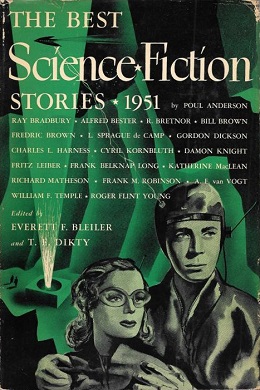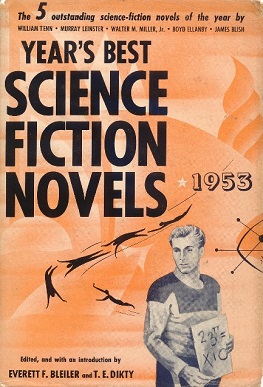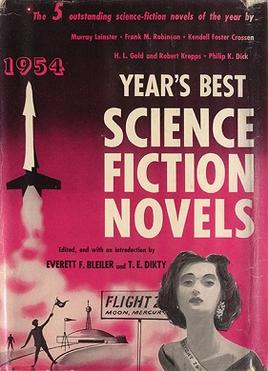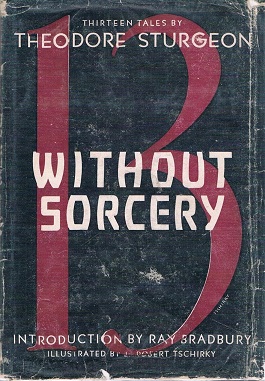
Thaddeus Maxim Eugene (Ted) Dikty was an American editor who also played a role as one of the earliest science fiction anthologists, and as a publisher.
"Knock" is a science fiction short story by American writer Fredric Brown. It begins with a piece of Flash fiction based on the following passage by Thomas Bailey Aldrich:
Imagine all human beings swept off the face of the earth, excepting one man. Imagine this man in some vast city, New York or London. Imagine him on the third or fourth day of his solitude sitting in a house and hearing a ring at the door-bell!
Everett Franklin Bleiler was an American editor, bibliographer, and scholar of science fiction, detective fiction, and fantasy literature. In the late 1940s and early 1950s, he co-edited the first "year's best" series of science fiction anthologies, and his Checklist of Fantastic Literature has been called "the foundation of modern SF bibliography". Among his other scholarly works are two Hugo Award–nominated volumes concerning early science fiction—Science-Fiction: The Early Years and Science-Fiction: The Gernsback Years—and the massive Guide to Supernatural Fiction.
Advent:Publishers is an American publishing house. It was founded by Earl Kemp and other members of the University of Chicago Science Fiction Club, including Sidney Coleman, in 1955, to publish criticism, history, and bibliography of the science fiction field, beginning with Damon Knight's In Search of Wonder.

The Best Science Fiction Stories: 1950 is a 1950 anthology of science fiction short stories edited by Everett F. Bleiler and T. E. Dikty. An abridged edition was published in the UK by Grayson in 1951 under the title The Best Science Fiction Stories. The stories had originally appeared in 1949 in the magazines Astounding, The Saturday Evening Post, Fantasy and Science Fiction, Fantastic Adventures, Maclean’s, Thrilling Wonder Stories, Blue Book and Startling Stories. The anthology was later combined with the 1949 volume and reissued as Science Fiction Omnibus.

The Best Science Fiction Stories: 1951 is a 1951 anthology of science fiction short stories edited by Everett F. Bleiler and T. E. Dikty. An abridged edition was published in the UK by Grayson in 1952 under the title "The Best Science Fiction Stories: Second Series". Most of the stories had originally appeared in 1950 in the magazines Fantasy and Science Fiction, Worlds Beyond, Astounding SF, Other Worlds, Galaxy Science Fiction, Fantastic Story Quarterly, Startling Stories, Collier's Weekly, Thrilling Wonder Stories and Weird Tales.

The Best Science Fiction Stories: 1952 is a 1952 anthology of science fiction short stories edited by Everett F. Bleiler and T. E. Dikty. An abridged edition was published in the UK by Grayson in 1953 under the title The Best Science Fiction Stories: Third Series. The stories had originally appeared in 1951 and 1952 in the magazines Super Science Stories, Fantasy and Science Fiction, Galaxy Science Fiction, Worlds Beyond, Startling Stories, New Worlds, Marvel Science Fiction, Esquire, Man’s World and Suspense Magazine.

The Best Science Fiction Stories: 1953 is a 1953 anthology of science fiction short stories edited by Everett F. Bleiler and T. E. Dikty. An abridged edition was published in the UK by Grayson in 1955 under the title The Best Science Fiction Stories: Fourth Series. The stories had originally appeared in 1952 in the magazines Fantasy and Science Fiction, Thrilling Wonder Stories, Galaxy Science Fiction and Astounding.

The Best Science Fiction Stories: 1954 is a 1954 anthology of science fiction short stories edited by Everett F. Bleiler and T. E. Dikty. An abridged edition was published in the UK by Grayson in 1956 under the title The Best Science Fiction Stories: Fifth Series. The stories had originally appeared in 1953 in the magazines Avon Science Fiction and Fantasy Reader, Fantasy and Science Fiction, Amazing Stories, Fantastic, Astounding and Galaxy Science Fiction.

The Best Science Fiction Stories and Novels: Ninth Series is a 1958 anthology of science fiction short stories edited by T. E. Dikty. The stories had originally appeared in 1956 and 1957 in the magazines Astounding, If, Fantasy and Science Fiction, Venture Science Fiction Magazine, Satellite and Science Fiction Stories.

Year's Best Science Fiction Novels: 1952 is a 1952 anthology of science fiction novels and novellas edited by E. F. Bleiler and T. E. Dikty. An abridged edition was published in the UK by Grayson in 1954 under the title The Year's Best Science Fiction Novels. The stories had originally appeared in 1951 in the magazines Astounding, Super Science Stories and Two Complete Science-Adventure Books.

Year's Best Science Fiction Novels: 1953 is a 1953 anthology of science fiction novels and novellas edited by E. F. Bleiler and T. E. Dikty. An abridged edition was published in the UK by The Bodley Head in 1955 under the title Category Phoenix. The stories had originally appeared in 1952 in the magazines Astounding, Galaxy Science Fiction and Thrilling Wonder Stories.

Year's Best Science Fiction Novels: 1954 is a 1954 anthology of science fiction novellas edited by E. F. Bleiler and T. E. Dikty. An abridged edition was published in the UK by Grayson in 1955 under the title The Year's Best Science Fiction Novels: Second Series. The stories had originally appeared in 1953 and 1954 in the magazines Amazing Stories, Thrilling Wonder Stories, Science Stories, Galaxy Science Fiction and Space Science Fiction.

Imagination Unlimited is an anthology of science fiction short stories edited by Everett F. Bleiler and T. E. Dikty, first published in hardcover by Farrar, Straus & Young in 1952. As originally published, the anthology includes thirteen stories by various authors, with an introduction and four brief essays by the editors. In the UK The Bodley Head published the work as two separate anthologies in 1953, one, containing the first six stories, under the same title as the American edition and the other, containing the remaining seven stories, as Men of Space and Time. The anthology was also reprinted in an abridged paperback edition containing seven of the stories by Berkley Books in April, 1959. Only the original edition included the introduction and the essays.

The Incredible Planet is a science fiction fix-up novel by American author John W. Campbell, Jr. It was published in 1949 by Fantasy Press in an edition of 3,998 copies. The novel is a collection of three linked novelettes that were not accepted for the magazine Astounding SF. The stories are sequels to Campbell's 1934 novel The Mightiest Machine.

The Black Star Passes is a fixup of science fiction short stories by American author John W. Campbell Jr. It was first published in 1953 by Fantasy Press in an edition of 2,951 copies. The book is the first in Campbell's Arcot, Morey and Wade series, and is followed by the novels Islands of Space and Invaders from the Infinite. The stories originally appeared in the magazines Amazing Stories and Amazing Stories Quarterly, and were "extensively edited" for book publication, with Campbell's approval, by Lloyd Arthur Eshbach.

Without Sorcery is a collection of science fiction and fantasy short stories by American writer Theodore Sturgeon. The collection was first published in 1948 by Prime Press in an edition of 2,862 copies of which 80 were specially bound, slipcased and signed by the author and artist. The stories first appeared in the magazines Astounding and Unknown.
Shasta Publishers was a science fiction and fantasy small press specialty publishing house founded in 1947 by Erle Melvin Korshak, T. E. Dikty, and Mark Reinsberg, who were all science fiction fans from the Chicago area. The name of the press was suggested by Reinsberg in remembrance of a summer job that he and Korshak had held at Mount Shasta.

"Summer Wear" is a science fiction short story by American writer L. Sprague de Camp, part of his Viagens Interplanetarias series. It is the first (chronologically) set on the planet Osiris. It was first published in the magazine Startling Stories in the issue for May, 1950. It first appeared in book form in the anthology The Best Science Fiction Stories: 1951, edited by Everett F. Bleiler and T. E. Dikty, published in hardcover by Frederick Fell in 1951, and was gathered together with other Viagens stories in the collection The Continent Makers and Other Tales of the Viagens, published in hardcover by Twayne Publishers in 1953, and in paperback by Signet Books in 1971. The story has been translated into Portuguese, Dutch, Italian and German.

Science-fiction and fantasy magazines began to be published in the United States in the 1920s. Stories with science-fiction themes had been appearing for decades in pulp magazines such as Argosy, but there were no magazines that specialized in a single genre until 1915, when Street & Smith, one of the major pulp publishers, brought out Detective Story Magazine. The first magazine to focus solely on fantasy and horror was Weird Tales, which was launched in 1923, and established itself as the leading weird fiction magazine over the next two decades; writers such as H.P. Lovecraft, Clark Ashton Smith and Robert E. Howard became regular contributors. In 1926 Weird Tales was joined by Amazing Stories, published by Hugo Gernsback; Amazing printed only science fiction, and no fantasy. Gernsback included a letter column in Amazing Stories, and this led to the creation of organized science-fiction fandom, as fans contacted each other using the addresses published with the letters. Gernsback wanted the fiction he printed to be scientifically accurate, and educational, as well as entertaining, but found it difficult to obtain stories that met his goals; he printed "The Moon Pool" by Abraham Merritt in 1927, despite it being completely unscientific. Gernsback lost control of Amazing Stories in 1929, but quickly started several new magazines. Wonder Stories, one of Gernsback's titles, was edited by David Lasser, who worked to improve the quality of the fiction he received. Another early competitor was Astounding Stories of Super-Science, which appeared in 1930, edited by Harry Bates, but Bates printed only the most basic adventure stories with minimal scientific content, and little of the material from his era is now remembered.
















